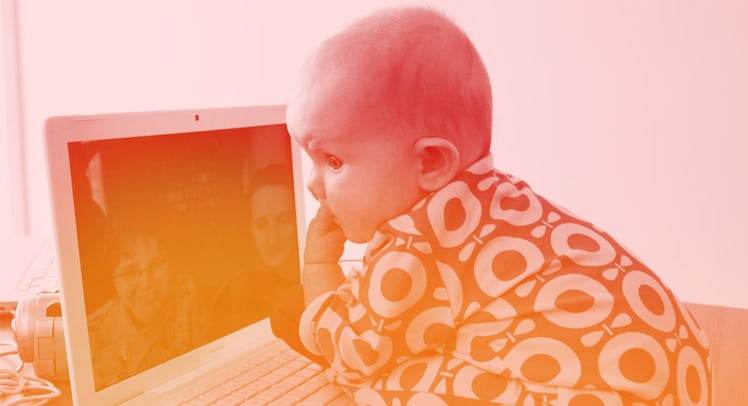FaceTime Isn’t Screen Time. It’s Good for Babies.
Screen time in the form of video-chatting is more than OK for babies. It's good for them.

Parents worry about screen time — and rightly so. Screen time in the form video chatting with family members isn’t really “screen time” at all, an increasing amount of experts argue because it benefits very young children in unique ways. Toddlers under two years old can tell the difference between this and YouTube videos and experience actual developmental benefits from these interactions. The American Academy of Pediatrics’ revised screen time guidelines note that video chatting is a unique exception for very young children, so go ahead and FaceTime with Grandma, as long has Grandma can figure out her end.
“That one-hour limit recommendation does not include constructive/connective types of media use such as video-chatting, taking photos or making videos, looking at maps or looking up information online together,” Jenny Radesky, a physician and coauthor of the AAP’s’ recommendations, told Slate.
This is not simply because it’s good for toddlers to have relationships with extended family members like grandma and grandpa, but because they learn more from these interactions as well. There’s been evidence since 2013 that 24 to 30-month-year-olds can pick up certain verbs from video-chatting, but not other video interactions. One study, published in Developmental Science, found that children as young as a year old learned novel words and word patterns from FaceTiming, but did not learn from pre-recorded videos designed to teach the same things.
Experts suspect young children benefit from this level of interactive engagement because they absorb valuable information about social responses to certain words and behaviors. The possibility that it might make toddlers more excited the next time they see their relatives is just bonus, if that happens.
Other research indicates that a majority of parents made exceptions for video-chatting over other screen time, and were ahead of the AAP’s new policy statement. Still, the new guidelines give parents a better reason to keep doing what they’re doing, other than Aunt Jan wants to sing happy birthday. It’s important to note that like co-viewing other media content with children as they get older, parental participation in video-chats is crucial. Handing a 1-year-old an iPhone is only asking for trouble.
“New evidence shows that infants and toddlers regularly engage in video-chatting,” Radesky and colleagues write. “But the same principles regarding a need for parental support would apply in order for infants and toddlers to understand what they are seeing.”
This article was originally published on